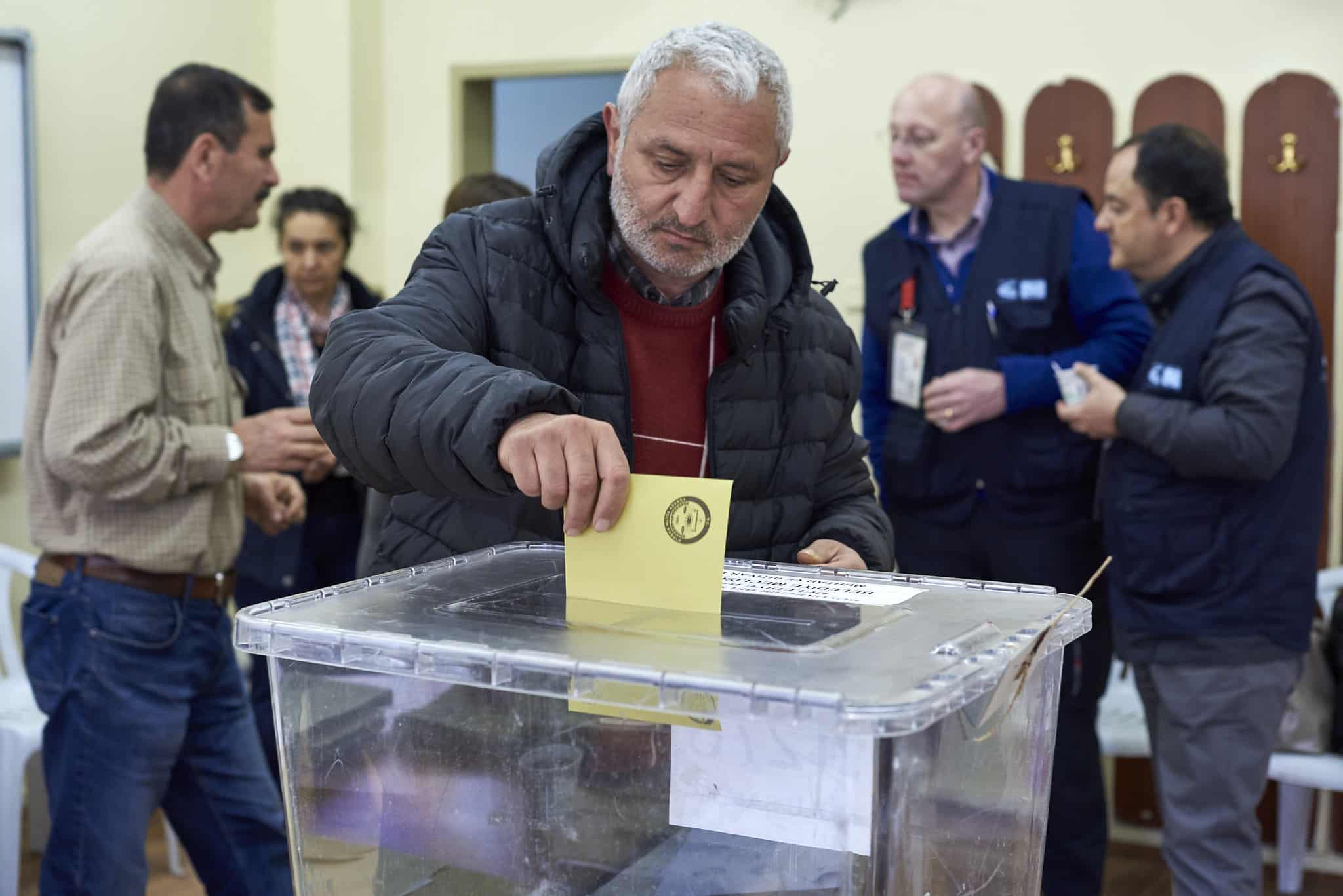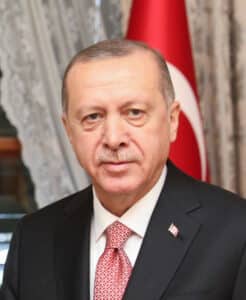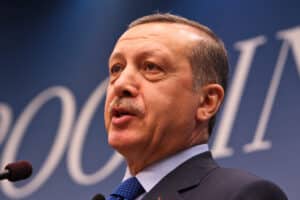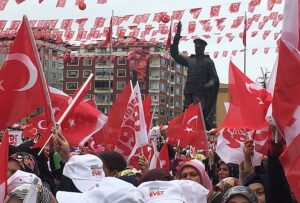Person casting a ballot at the 2019 local elections (Source: Flickr, 2019)
On Sunday the 30th of March, Türkiye goes to the polls to elect new mayors and administrators in all 81 provinces. More than 60 million Turks are eligible to vote in the elections that historically have a high turnout rate of more than 80%. The elections take place in the wake of the 2023 presidential elections in which Erdoğan prevailed over a broad opposition coalition led by Kemal Kılıçdaroğlu. This victory possibly provides Erdoğan’s People’s Alliance coalition (AKP, MHP) the momentum it needs to take back major cities such as Ankara, Istanbul and Antalya that were lost to the opposition in the last local elections in 2019. Although Erdogan is not on the ballot himself, he is actively involved in promoting the candidates of his AK Party. Through his domination of the media landscape, he has sought to create favourable conditions for the candidates he has endorsed. The elections will be a litmus test for the cohesion of the opposition coalition that seems to be falling apart in some large cities, especially in Istanbul. Likewise, it is considered a test of levels of support for Erdoĝan. First results are expected around 10 p.m. on Sunday.
State of the economy
The elections take place in very turbulent economic times for Türkiye. The economy has experienced significant and frankly surprising growth in 2023 of nearly 5% of total GDP. Although stimulus measures by the Turkish government including wage and pension hikes facilitated economic growth, they failed to effectively alleviate poverty across the nation, especially in urban centres. Rampant inflation, up to nearly 70% this year, has decimated savings and spending power of the majority of Turkish citizens. In an effort to stabilise the Turkish Lira, interest rates have been set at 45% – making the country very unattractive for foreign investments. Coupling that with an escalating brain drain and heavily affected trade relations with its major trade partner Russia, the future of the Turkish economy seems uncertain at best.
More than 30% percent of the Turkish population is currently at risk of poverty, negating the economic growth that alleviated so many from poverty during the early years of Erdogan’s reign. Although severe economic management and low interest rates aimed at creating an export economy have backfired and plunged the country in a deep crisis, it remains to be seen what the political impact will be.
Generally, the state of the economy is a strong indicator for political support for the ruling party. Erdoğan, however, still emerged victorious in the 2023 general elections by diverting blame for economic malaise to ‘foreign financial tools’. Large investments in urban welfare services and major infrastructure projects as well as military developments have been extensively highlighted in political campaigns as well as through state media in an effort to also show the achievements of Erdoğan’s administration.
Election and media freedom
For the past years, elections in Türkiye have been labelled as ‘free but not fair’. Free, because there are genuine alternative choices to the ruling AK Party. Not fair, because there are serious concerns about the ways in which the AKP infringes on the political rights of opposition parties. It routinely uses state institutions such as the judiciary and supreme electoral council (YSK) to weaken or co-opt political rivals.
It makes those institutions, at least partially, an extension of the AK party that uses them to further its own political goals. Moreover, over the past two decades, especially since the 2012 Gezi park protests and the 2013 corruption scandal, Erdoğan has severely restricted freedom of press and expression in Türkiye.
As was the case in the general elections in 2023 and other elections before that, the AKP continues to use its almost complete domination of the media to promote its political ambitions. According to media watchdogs, around 90% of media is in the hands of the AKP and its allies. It is most evident in the negligible amount of screen time opposition candidates have received compared to the near-constant AKP propaganda on state television.
In recent years, the governments has sought to cripple the online space, the last real bastion of free speech. The 2022 ‘disinformation law’ paved the way for the prosecution of journalists and other social media users expressing their opinions online. Tech companies that operate within Türkiye have been forced to comply with new laws and regulations under threat of large fines and bandwidth restrictions that makes remaining operational virtually impossible. This means there is very little messaging that contradicts the AKP’s narrative and promotion of its candidates. Moreover, the ban on several VPN services by the government in the leadup to the elections exposes individuals or organisations that would otherwise have remained anonymous.
AKP coalition and strategies
The AKP, together with the ultranationalist far-right Nationalist Movement Party forms the People’s Alliance. It was formed in the run-up to the 2018 general elections. A range of other parties has been part of the alliance, including some right-wing nationalist parties. Core topics are the ‘fight against terror’, national identity, family values and a respected position on the world stage. Identity politics form the core of the messaging of the PA. Although there is little reporting about it in this election, the AKP is known to use extensive patronage networks and handouts as a lever for political support. With a membership of more than 10 million Turks and 20 years of rule, the AKP has permeated all layers of society creating a broad sense of dependence among the population.
The coalition specifically enjoys support in the Central Anatolian heartlands where many citizens of lower socio-economic class reside. The identity-based political messaging finds fertile ground in those areas that are generally much more conservative.
The opposition
The 2019 local elections saw a form of cooperation under the name People’s Alliance between opposition parties. The centre-left Cumhuriyet Halk Partisi (CHP) and the Kemalist and nationalist Good Party (IP) were the main parties in this alliance. Tacit support from other parties such as the Kurdish HDP, helped the opposition to gain the upper hand in strategic areas such as Ankara and Istanbul. By not fielding a candidate in those cities, voters were encouraged to rally behind one opposition candidate. It led to a momentous victory for the opposition that triumphed in most large cities.
The narrow loss in the 2023 general elections has led to disillusionment and the breakdown of opposition cooperation. Internal strife plagues several parties, including the CHP where a new leader was installed after Kılıçdaroğlu stepped down following the defeat in 2023. IP also suffered fragmentation due to political disputes. The decision of the Kurdish HDP-successor party DEM as well as IP to field their own candidates in the mayoral race in Istanbul is emblematic of the unravelling of the coalition. It is also feared that demoralised voters will stay home to show their discontent.
Main battlegrounds
The larger cities, or so-called metropolitan municipalities, are where the main standoff between the AKP and the opposition will take place. Although the AKP is still very popular in rural Turkey, urban populations have been shifting away from the AKP and identity politics more generally. Currently, six out of the seven largest metropolitan municipalities, including Ankara, Istanbul, Antalya, Izmir and Adana have CHP mayors. Only the 4th largest city, Bursa, is currently administered by an AKP mayor. Control over large cities provides a party with municipal budgets they can use to create favourable conditions for the general elections. Financing of large projects and job creation are widely used in campaigns by both parties.
Istanbul is broadly considered the most important political battleground and it is there that the most fierce race is expected to take place. The city houses nearly 20% of the Turkish population, is an economic powerhouse and also has symbolic value for Erdoğan who became mayor of Istanbul in 1994. Ekrem İmamoğlu, the current mayor and Erdoğan’s political nemesis, will face off against AKP candidate Murat Kurum, a former environment and urbanisation minister. The outcome of this race could have significant implications for the political future of Türkiye. The breakdown of the opposition coalition, especially in Istanbul, puts some serious doubt on whether the opposition is united enough to pose a serious challenge to Erdoĝan and the AKP. Currently, İmamoğlu trails in some polls while having a slight advantage in others. The vote of the capital’s Kurdish population is likely to be decisive for the CHP to achieve a victory over AKP. However, there are also reports that disillusioned AKP voters are switching to more conservative parties such as the Islamist New Welfare Party.
In the capital Ankara, CHP mayor Mansur Yavas is expected to retain his seat being one of the more popular politicians in Turkey. Close races are expected to take place in Antalya, Bursa and Adana.
What’s at stake? Predictions and implications
Even if there is not a direct impact on national-level politics, local elections are considered an extension of national elections in Türkiye. The outcome of Sunday’s elections will provide a valuable insight into the political attitudes in the country. The degree to which the opposition is able to retain its control over key cities shapes the ambitions they have for the 2028 general elections where Erdoğan has claimed he will no longer be on the ballot. Many analysts consider a victory for İmamoğlu in Istanbul to pave the way for a candidacy in the 2028 presidential elections.
If the People’s Alliance coalition were to emerge victorious in Istanbul, this can be interpreted by Erdoğan and the AKP as a mandate to continue on the set course. Highly controversial constitutional amendments such as those made in 2017, have transferred executive power to Erdoğan while abolishing the office of the prime minister and taking power away from parliament. It has already provided Erdoğan with a third term in power, even though only two terms are allowed. Although some safeguards remain in place, further constitutional amendments in the future are not ruled out. In any case it would be wise to remain vigilant as a defeat in Istanbul and other major cities might also trigger Erdoğan to double down on repressive measures to secure victory for the AKP in 2028.
With Erdoğan’s announcement that he will not be up for election in the 2028, the local elections are likely the last elections where he can use his full political weight and influence to support AKP candidates. Of course it remains to be seen whether it will indeed be his last elections as he proclaimed to voters in 2023 that “we will be together until the grave”.



